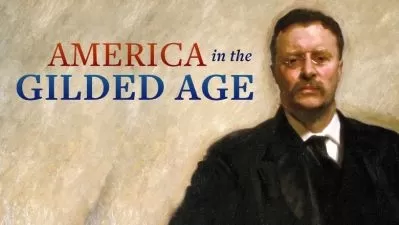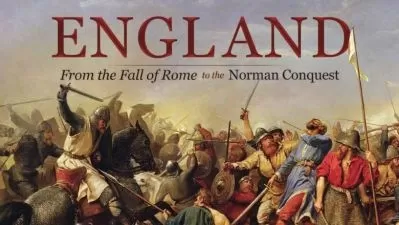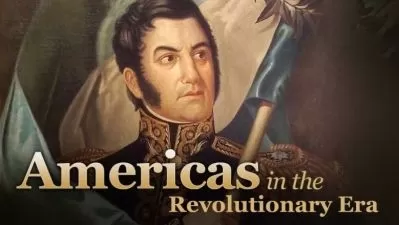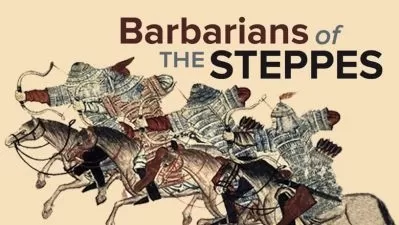The History of Spain: Land on a Crossroad
Joyce E. Salisbury
12:06:23
Description
Spain has played a unique and pivotal role in Western civilization. It has historically stood at a critical crossroad—a crossroad of geography, of cultures, of religions, of ideas, of trade, and more. Spain’s strategic location, through the centuries, has made it a magnet for multiple different peoples, and it has participated in and witnessed numerous major shifts, trends, and historical moments.
Across 5000 years, from its prehistory and ancient Roman rule to the glory of Moorish al-Andalus, and from its empire building to its religious passions and kingly dynasties, Spain’s history has been extraordinarily dramatic, colorful, poignant, inspiring, and heartrending.
And yet, Spain’s remarkable role has not always been detailed in standard history curricula, at times overshadowed by the high profile of other European powers. But to understand the unfolding of Spain’s epic history is to come to terms with one of the West’s great civilizations, and to grasp its enduring presence and influence on the world stage. Consider these singular features of Spanish history:
- The Renaissance began in Spain 15 years before the rest of Europe;
- Spain was both the instigator and the catalyst for the opening of the New World, spanning North, Central, and South America—leaving Spanish as the world’s second most widely spoken language, following only Chinese;
- Spain was a primary player in the vast commercial revolution that changed the world in the 17th century;
- The collapse of Spain’s great empire both prefigured and sheds light upon the later disintegration of other European empires;
- Spain’s 20th century history reveals much about the rise and fall of fascism in Europe.
In The History of Spain: Land on a Crossroad, Professor Emerita Joyce E. Salisbury of the University of Wisconsin unfurls a broad and fascinating panorama of Spanish history, spanning the centuries from the first Neolithic settlement of the peninsula to Spain’s 20th century Civil War.
Linking one extraordinary era with the next, the course begins with how early Spain drew a spectrum of peoples from ancient Africa, the Mediterranean, and the Middle East, who formed vibrant communities on the peninsula. From there, you’ll witness the subjugation of the peninsula by both Rome and Gothic peoples, leading to the breathtaking drama of Islamic Spain and the Reconquista, Catholic Spain and the Inquisition, and the conquest of the New World. In the final lectures, you’ll travel into the royal dynasties and dazzling artistic heritage of the Habsburg and Bourbon kings, and you’ll track Spain’s storied emergence into the modern world.
These 24 accessible and highly enjoyable lectures offer you a penetrating overview of the development of Spanish civilization. Designed for a wide audience, the course presents a comprehensive picture of Spanish life and culture, encompassing history, architecture and art, religion, science, and the humanities, as well as offering many pointers for travel in Spain, highlighting the country’s outstanding historical and cultural sights, and why they’re important.
A Thrilling Journey through Five Millennia of History
In the course’s opening, you’ll trace the melding of Neolithic peoples, Celts, Greeks, Phoenicians, and other immigrants who gave the Spanish peninsula its unique character. Across the centuries of history and the numerous seminal epochs the course illuminates, you’ll witness extraordinary historic moments such as:
- The Kingdom of the Visigoths--Following Rome’s imperial domination of the region, discover how the Visigoths wrested control of the peninsula, and contemplate the remarkable society they built--a culture that produced great art, codes of law, theology, and hugely influential scholarship in the intellectual centers of Toledo and Seville;
- The Golden Age of Islamic Spain--Take account of the nearly seven centuries of Islamic rule of Spain, and its zenith in the legendary Caliphate of Córdoba; grasp the underpinnings of Córdoba’s great wealth, and its astonishing achievements in art, science, aesthetics, and learning, that spread its fame across the known world;
- Spain’s Catholic Passion--Track the deeply integral presence of Catholicism in Spanish life over the centuries. Learn about Spain’s role in the establishment of the Roman Catholic Church, the Catholic Counter-Reformation, and the Inquisition; trace Spain’s bloody wars against Protestants and Muslims, as well as its history and remarkable resurgence of religious tolerance;
- The New World: Treasure and Tragedy--Witness how Columbus’s voyages led to the carving out of vast Spanish possessions in the Americas; follow the huge commercial empire which transpired, and the exploits of conquistadors, missionaries, and pirates, against a backdrop of economic oppression, slavery, and the decimation of native populations;
- The Habsburgs: A Splendorous Era--In yet another illustrious epoch, learn how the Habsburg kings spent Spain’s New World treasure in the glorious architecture of Madrid and the El Escorial summer palace, and in fostering an artistic renaissance in the work of some of history’s greatest painters, composers, and literary artists;
- Spain in the Modern World--Following the disintegration of Spain’s empire, observe its adaptations and contributions to the modern era, from its great 20th century artistic and intellectual innovators to its trials under the dictator Francisco Franco and its place as a vibrant 21st century nation.
A Rich Tapestry of Spanish Culture
As a primary strength of this course, Professor Salisbury brings to the table a vast and extraordinarily detailed knowledge of the Iberian Peninsula; its history as well as its unique culture. Demonstrating a flair for historical narrative, she expertly conveys the monumental scope and movement of events while at the same time revealing details that make the story compellingly three-dimensional. In her descriptions of the ancient trade in garum (Roman fish sauce, a surprisingly valuable commodity), the glittering court culture of Islamic Spain, and the features of life aboard Columbus’s ships, these distant eras come vividly alive.
Intertwined with the unfolding of Spanish history, Professor Salisbury illuminates Spain’s iconic cultures, and its phenomenal contributions to art, architecture, literature, music, theology, and learning. In the lecture on Spain’s gypsy heritage, you’ll explore the origins and forms of flamenco music and dance, and their deep links to gypsy and Andalusian culture. You’ll learn how the ritual of bullfighting—held as an art form in Spain—evolved from its origins as an equestrian pastime of the nobility to its markedly altered modern form.
Across the centuries, you’ll explore jewels of Spanish architecture, from the resplendent Moorish Alhambra and Alcázar of Seville to the sublime Sagrada Familia cathedral of Catalan modernist Antoni Gaudí. Professor Salisbury also highlights the evolution and forms of Spanish music, spanning the eras from the music of Islamic Spain to the great Baroque composers Guerrero and de Victoria and the 19th century master Albeniz. And you’ll encounter Spain’s geniuses of the visual and written arts, encompassing such masters as the painters Velasquez, el Greco, Goya, and Picasso, and writers from the philosophers Averroes and Maimonides to literary greats Lope de Vega and Cervantes.
The History of Spain: Land on a Crossroad takes you on a wide-ranging journey through the remarkable scope of Spanish civilization, life, and culture. Travel with us to this extraordinary land, and savor the majesty and the great human drama of the story of Spain.
More details
User Reviews
Rating
Joyce E. Salisbury
Instructor's CoursesJoyce E. Salisbury is Professor Emerita of Humanistic Studies at the University of Wisconsin–Green Bay, where she taught history and served as associate dean of Liberal Arts and Sciences and director of International Education. She earned her Ph.D. in Medieval History at Rutgers University, specializing in religious and social history.
Professor Salisbury began her career performing research in Spain, and she has continued to travel there to conduct further research, lecture, and guide students and other travelers. She is currently working on a book about the history of early Christian martyrdom.
In addition to receiving the University of Wisconsin’s Outstanding Teaching award, she was named Professor of the Year in 1991 by the Council for Advancement and Support of Education. She has taught three times on Semester at Sea, a study-abroad program on a ship that circumnavigates the world with more than 500 students for a full semester.
Professor Salisbury is a prolific author whose books include the award-winning Perpetua’s Passion: Death and Memory of a Young Roman Woman; The Beast Within: Animals in the Middle Ages; Rome’s Christian Empress: Galla Placidia Rules at the Twilight of the Empire; and the widely used textbook The West in the World. She has been interviewed many times on National Public Radio on topics from religion to the books she has written, and she appeared on the PBS special The Road from Christ to Constantine.

The Great Courses
View courses The Great Courses- language english
- Training sessions 24
- duration 12:06:23
- English subtitles has
- Release Date 2023/06/07

















